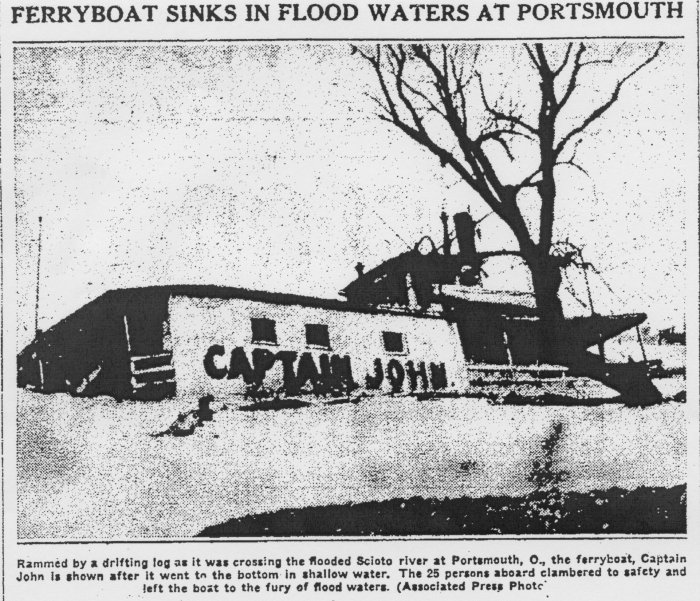1937 Flood Stories
January 26, 1937 - (Article taken from The Daily Independent, Murphysboro, IL
U.S. Army engineers prepared for a long siege throughout the valley. Portsmouth, O., where gasoline tanks were torn loose and their contents spilled over the surface of the flood, the 25,000 refugees were told that the city would be inundated for another two weeks.
Eyewitness Tells of Flood at Portsmouth
Article taken from The Lima News, January 24, 1937
By LYNN WITTENBURG
For the Associated Press
Men, women and children are poking their heads out windows here begging to be rescued.
They thought this flood would not amount to anything and that they could stay in the second stories of their homes. Now there aren't enough boats to reach all of them.
At least 20 who stayed too long nearly drowned in those cold, muddy waters covering half of this city and a 10-mile populated area along the Ohio river front.
Ironwood Daily Grove
Ironwood, MI
1-23-1937
Portsmouth, OH, January 23 --(AP)-- Hunger, cold, sickness and the cries of hundreds of marooned persons plagued flood-besieged Portsmouth today.
Half of Portsmouth was covered by flood waters that were 11 feet deep in the business district.
Four inches of snow and freezing temperatures added to the hardship of the 25,000 forced to evacuate their homes in greater Portsmouth.
The Ohio river stage at 7 a.m. was 66.3 feet and rising two-tenths of a foot an hour.
Food Shortage Acute
The Scioto also poured a muddy tide over the city from the west.
City officials described the food and milk shortage as acute and sought help from the outside.
Physicians were called throughout the night to care for children in refugee centers.
Crews of rescue workers laboring desperately to evacuate all homes in the flood zone under the direction of Fire Chief Robert Leedom who reported that several hundred persons were begging to be rescued.
Leedom said a shortage of boats made rescue work difficult.
Those families trapped in their homes had sought safety on second floors, but they underestimated the rapid rise of the flood waters.
Appeals for bed clothing were sent out by relief workers, who reported that 50 children slept on the floor of a fire engine house at Sciotoville, last night without blankets.
Food Trucks Stranded
A ten-mile long stretch from the west section of Portsmouth, where the Scioto pours into the Ohio, east to Wheelersburg was covered by water back to where the hills begin.
An estimated 70,000 persons live in Portsmouth and the other affected towns of Sciotoville, New Boston and Wheelersburg, and officials said at least 20,000 were homeless.
Churches, schools, hospitals, garages, and even voting booths were crowded with shivering refugees.
Portsmouth officials were advised that trucks of food were stranded miles outside of the city, unable to get through flood waters.
All available boats were being used in rescue work here and none could be spared to meet the trucks.
CLEAN BEDS READY IN COLUMBUS FOR WEARY FLOOD STRICKEN CROWDS
This article was taken from Lima News, January 26, 1937
Columbus, O., Jan. 26 - A flood-weary band of refugees from Portsmouth, O., found a paradise of clean beds and good food today in the Masonic Temple and the First Congregational church here.
A special train brought 546 men, woman and children here from the Ohio river city, which was almost completely inundated four days ago. Another 750 where to arrive later today, and the special train will make round trips until 5,000 of Portsmouth's 25,000 homeless have been removed.
Almost every Columbus church will be used to quarter the flood victims.
TRAVEL 5 MILES TO TAKE TRAIN
The first contingent entrained last night, five miles north of Portsmouth after being taken by bus to the farthest point south it was safe for a train to go.
Red Cross staff members met the refugee train at the Union station. Taxicabs took them to their temporary homes, where their bodies will be healed and their morale restored during the period they are waiting for the water to recede from their homes.
Instead of hard floors, they slept on cots with sufficient blankets. They had enough room. In Portsmouth, 175 had been crowded into one room; 1,600 into a 10-room schoolhouse.
HARDSHIPS ARE RELATED
On the train they talked of the hardships, of what they had lost. Some had lost everything.
Mrs. Mary Brown, 80, salvaged only her pipe. She knows her home was overturned by the water, that nothing will be left when she gets back. She is sorry she moved from her farm to Portsmouth just before Christmas.
Mr. and Mrs. Ulysses S. Biggs moved their belongings three times to the homes of friends on higher ground.
Mrs. Blanche Coleman and her son, Ralph, had to leave their home by walking from a second story window across their porch roof to a boat.
Mrs. Sarah Justice and her son, Henry, will return to Portsmouth when the flood is over, knowing their home has been washed away. Caught in the flood, they were separated four days.
SAVE CHILDREN, NOTHING ELSE
Mr. and Mrs. Vernon, 32, and 27 years old, saved their six children but nothing else.
Many were suffering the after-nausea of anti-typhoid serum injections. One doctor and three nurses were on the train.
"No one is really ill," Dr. Albert L. Berndt said. "They are all sick at heart. Their nerves are gone. They think I can do something for them."
Dr. Berndt's office is under water.
Spirits began to rise almost immediately when they entered their new quarters. A blond boy played a hillbilly song on a piano in the basement of the temple. A boy who had a harmonica joined in, accompanied by one who had waded thru high water to get his guitar.
Others who still had their voices, but little else, began to sing.
